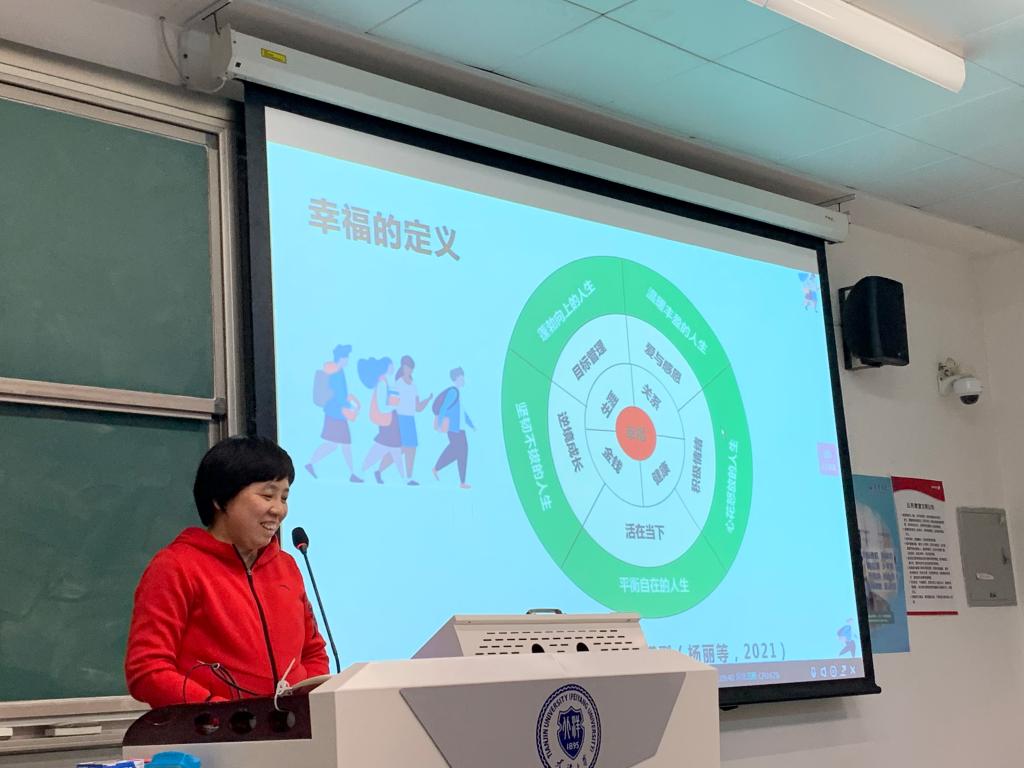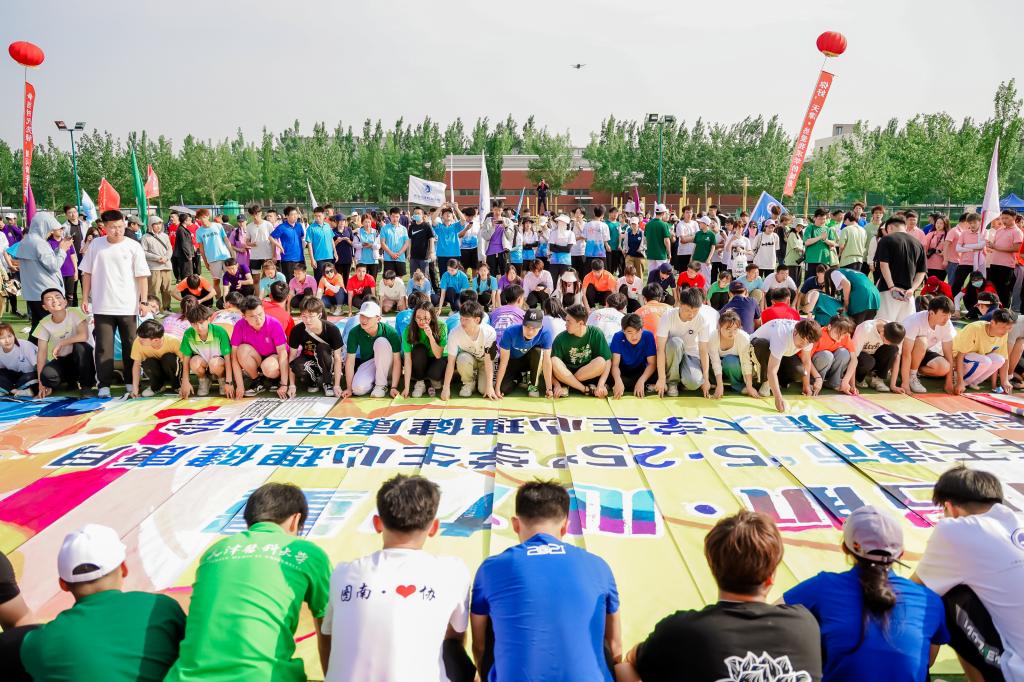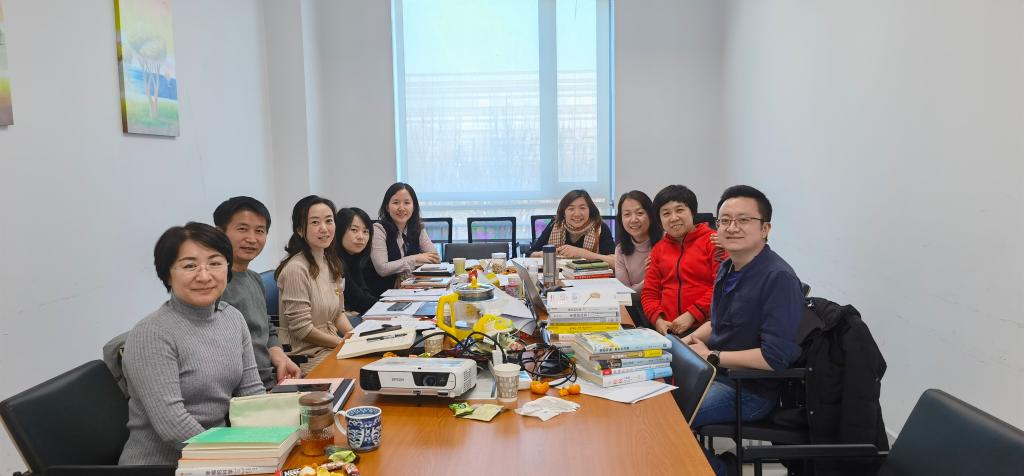“What's Happiness? What’s you understanding of Happiness? Like a thousand Hamlets in a thousand people's eyes, there is no unanimous answer to those questions,” said Prof. Yang Li, head of Tianjin University’s Mental Health Education Center who led a research team and opened a selective course on the Science of Happiness since the spring semester of 2021. Up to now, over 1,000 students have attended the course. Apart from in-class teaching and discussion, the university also held many sideline events attending to students’ psychological well-beings like guest lectures and student-led psychological activities that explored ways to enhance the feeling of happiness. According to Prof. Yang, tens of thousands of students have benefited from these happiness-related activities.
“We set up the course not to teach student some sole and correct definition of happiness, but rather, to help them explore the roots of a happy and healthy life.” said Prof. Yang.

Yang Li presents the first session of the course and discusses with students the definition of happiness.
As she planned, five Happiness courses offered by different teachers will be available to students to choose next semester. “Our teaching group includes both psychological practitioners from the university’s Mental Health Education Center and teachers that tend to student daily affairs. It’s a combination of theory and practice.” Prof. Yang introduced that teachers are still working on improving the course. “We aspire to make the course on Happiness a flagship course of our University, satisfying students’ pursuit of happiness as much as possible.”
A research-based and practice-oriented course curriculum
As mentioned above, Prof. Yang and her colleagues meant the course to be a combination of theory and practice. It starts with the discussion on “What’s Happiness” and inspires students to think about how relationship, health, income and career development impact people’s happiness. Then students are taught to manage emotions and behaviors for greater happiness by applying the science of the mind, body, and community. “We also encourage students to ponder and envision what kind of happy life they are living now and intend to live in future, a smooth and joyful life, or a free and balanced life, or a resilient life or a warm and rich life.”
The teaching team also drafted a pamphlet titled TJU Happiness Manual. It contains some strategies to help students build good habits, such as “Manage My Money”, “21-Day-Exercise Record”, “One-Week Mindfulness Breath Record and Body Scan Meditation”, “ABCDE Approach Against Difficulties” and “Time Management, Self-Care Wheel and Efficiency Improvement”.

TJU sets May as the Mental Health Month and holds Mental Health themed sports meeting each year.
Prof. Yang said that the faculty team would prepare the course together every semester and introduce into it state-of-the-art research updates about the science of happiness and other related fields brought by researchers from home and abroad.
“We paid special attention to the theoretical and scientific nature of the curriculum and included in it researches and theories in Positive Psychology, Clinical Psychology, Health Psychology and the traditional Chinese culture.”

The teaching crew led by Yang Li.
The course is also conducted in a cheerful way. In addition to in-class lectures, students will have mental training, experimental activities and quality development session. “We advocate a combination of experiential, interactive and engaging teaching,” said Prof. Yang.
She believes that the course will bring young people actionable insights into a happy life.
“ We introduce to students some modern science of human well-being and show them how to practice it. Hopefully, they are able to use the philosophical and technical ways taught in the course to make both themselves and others happy.That’s the mission of the course. ”
A close look into a course session
In the evening of Nov. 9, Zhao Jianbo, deputy party secretary of the School of Earth System Science was teaching about “Positive Emotions”. From psychological experiment introduction to Emotional Brain Traing (EBT) method, Zhao shared with students approaches to regulate their emotions and keep a positive mood. Students interacted with him through bullet screens by an online smart teaching platform called Rain Classroom.
“I have tried to enroll the course since I was a sophomore, and finally succeeded until I become a senior!” “The ice-breaking activity in the first class delights everyone! Many i-persons (an Internet meme referring to introverted people) become e-persons (an Internet meme referring to extroverted people)!” “The approaches to goal management I learned is working in my daily life.” “Involution makes me tired. But the Psychology of Happiness every week makes me rest.” Students highly praised the course.
“There is no fixed formula for happiness. We can only feel and experience it. Teaching the course has also changed me a lot.” said Zhao Jianbo. “We present in every course session some practical and accessible methods to enhance students’ ability to manage their emotions.”
He admitted that the teaching preparation process mitigated his stress and provided him with happiness. “We learn what we teach.”
By Wang Jingnan
Editor: Eva Yin






